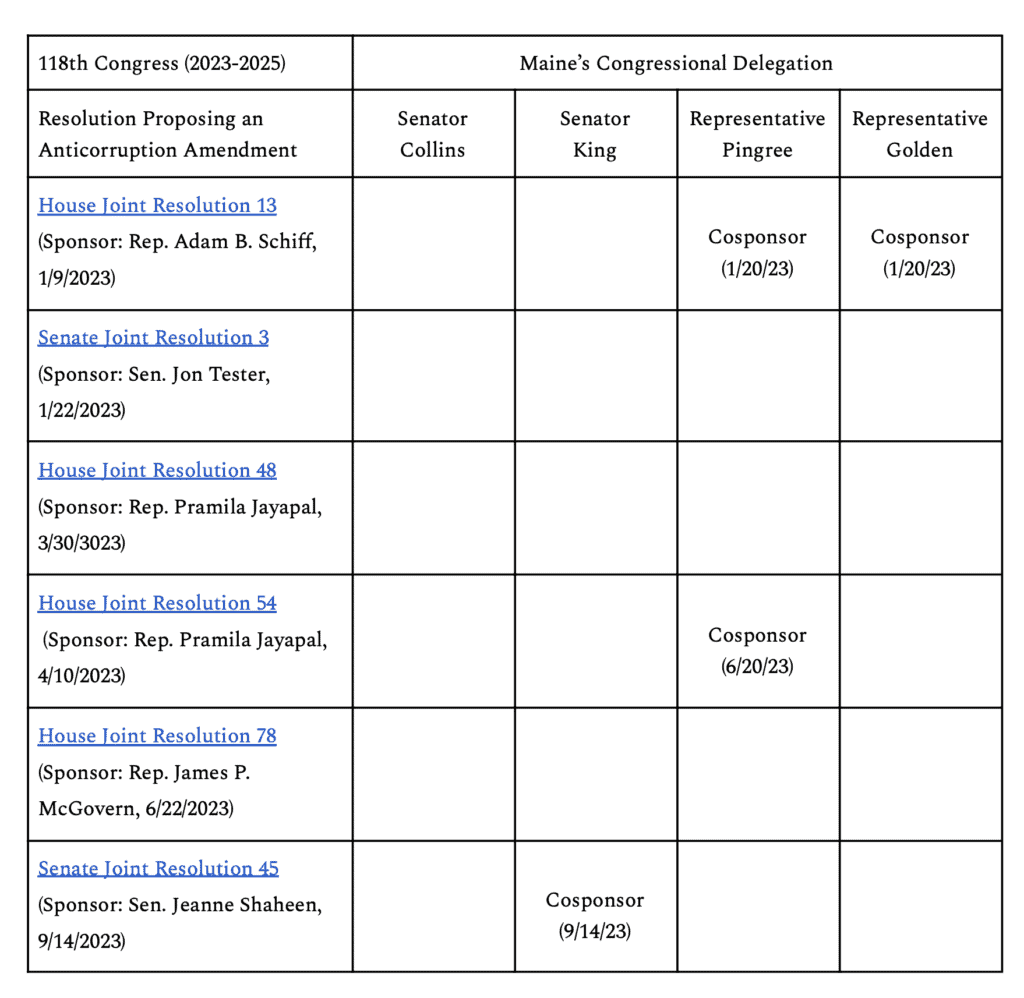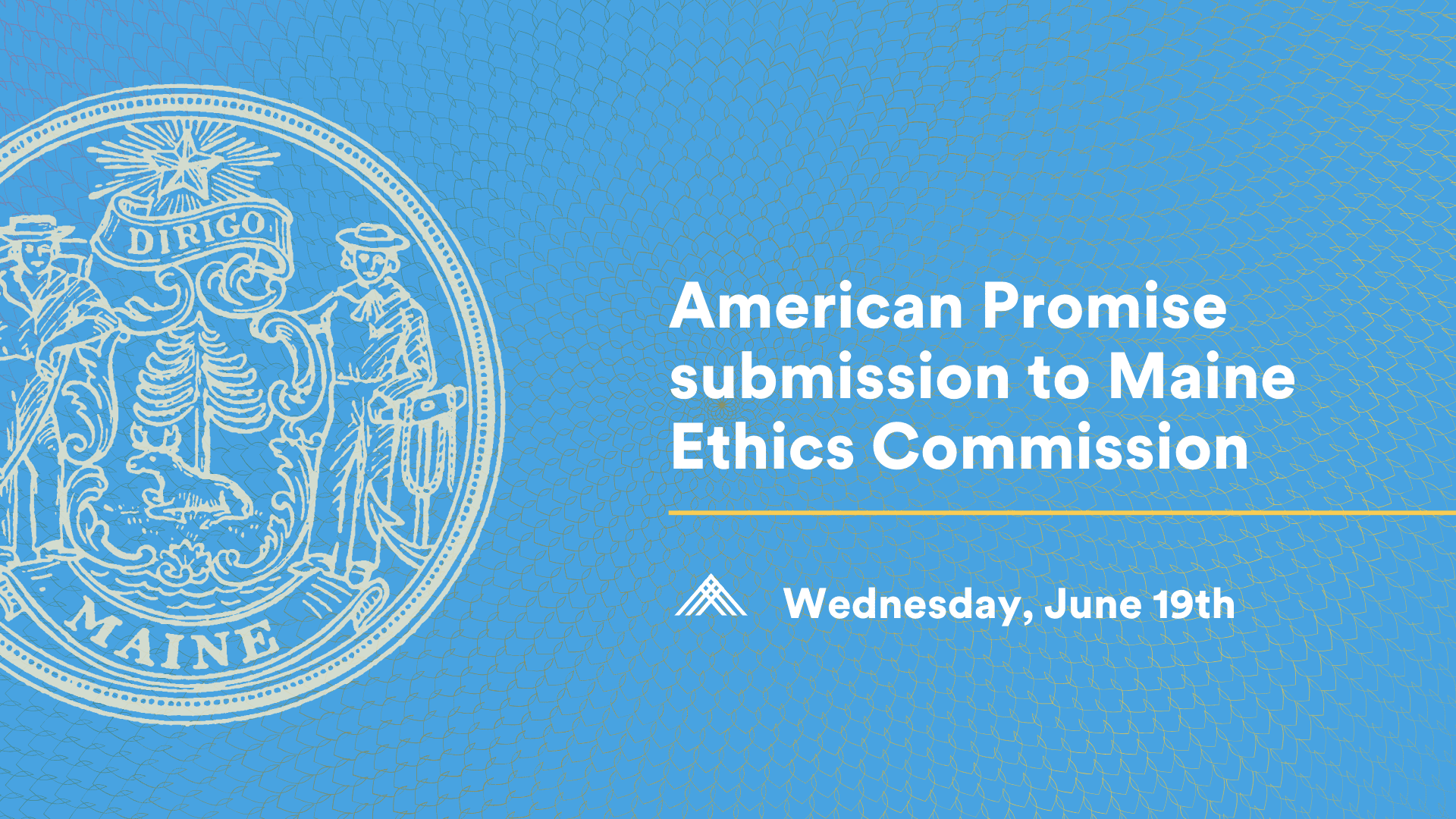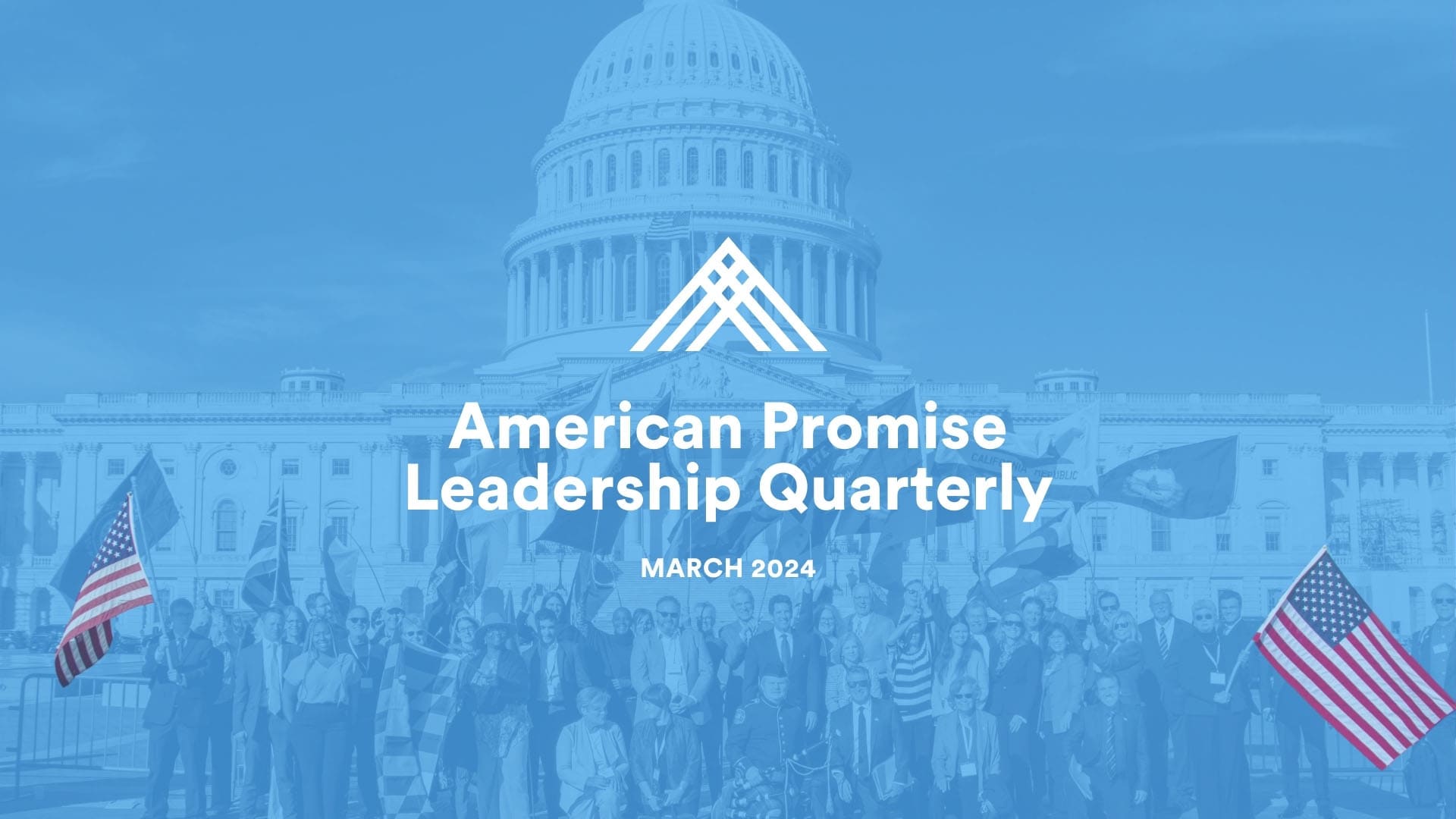Jonathan Wayne
Executive Director
Maine Commission on Governmental Ethics and Election Practices 135 State House Station
Augusta, ME 04333
Jonathan.Wayne@maine.gov
Dear Director Wayne,
Pursuant to Section 2(3) of 21-A MRSA § 1064 (“Ballot Question 2”), the Maine
Commission on Governmental Ethics and Election Practices (the “Ethics Commission”)
is charged with issuing an annual report “identifying anticorruption amendment
proposals introduced in Congress, and the members of Maine’s Congressional
Delegation sponsoring such proposals.”
To support the Ethics Commission in carrying out its charge, American Promise
respectfully submits these comments with two primary goals: (1) to provide the
Commission with an overview of the active support of Maine’s Congressional
Delegation for amendment proposals pending in the 118th Congress, and (2) to
recommend an approach for assessing whether particular amendment proposals comply
with Section 2 of Ballot Question 2.
American Promise is a nonprofit organization that mobilizes broad, cross-partisan
support for an amendment to the United States Constitution that would empower the
States and Congress to set reasonable guardrails on money in our political system. We
are proud to have over 8,000 supporters in the State of Maine, including several
volunteer leaders who dedicate countless hours to educating their fellow citizens about
a workable and enduring constitutional solution to the vexing problem of money in
politics.
I. Overview of Ballot Question 2’s Constitutional Amendment Provisions
On November 7, 2023, over eighty-six percent (86%) of the voters in Maine voted in favor of Ballot Question 2.
Ballot Question 2 has two main sections: Section 1 contains provisions to implement a prohibition of foreign spending in Maine’s elections, and Section 2 contains provisions that reaffirm Maine’s support for an amendment to the United States Constitution that would allow the States and Congress to enact limits on the role of money in elections. In this document, we focus exclusively on Section 2 of Ballot Question 2.
Section 2 has three key elements. First, it reaffirms support of Senate Paper 548 (“the 2013 Maine Resolution”), a joint resolution from 2013 in which Maine’s legislature declared “our support for an amendment to the United States Constitution regarding campaign finance that would reaffirm the power of citizens through their government to regulate the raising and spending of money in elections.” The 2013 Maine Resolution also called upon “each Member of the Maine Congressional Delegation to actively support and promote in Congress an amendment to the United States Constitution on campaign finance.” Section 2 of Ballot Question 2 incorporates the substantive principles of the 2013 Maine Resolution by reference.
Second, Section 2 articulates the types of principles that should be included in an effective anticorruption constitutional amendment:
A. That governmental power derives from the people, and influence and participation in government is a right of all the people and under the Constitution of Maine and the United States Constitution, should not be allocated or constrained based on the use of wealth to influence the outcome of elections and referenda; and
B. That Maine and the several states, and Congress with respect to federal elections, must have the authority to enact reasonable limits on the role of money in elections and referenda to secure the rights of the people of Maine to free speech, representation and participation in self-government; the principles of federalism and the sovereignty of the State of Maine and the several states; and the integrity of Maine elections and referenda against corruption and foreign influence. 1
Third, Section 2 includes a critical accountability provision:
For seven consecutive years beginning on July 31, 2023, the Commission on Governmental Ethics and Election Practices shall issue a report, following public comment, identifying anticorruption amendment proposals introduced in Congress, and the members of Maine’s Congressional Delegation sponsoring such proposals. 2
In the remainder of this document, we will (1) identify the anticorruption amendment proposals that have been introduced in the 118th Congress, noting support by members of Maine’s Congressional Delegation for such proposals, and (2) offer an approach for assessing whether any given anticorruption amendment proposal satisfies the principles set forth in the 2013 Maine Resolution and Section 2 of Ballot Question 2.
II. The Congressional Delegation’s Active Support for Anticorruption Amendment Proposals Pending in the 118th Congress
American Promise regularly monitors joint resolutions introduced in Congress calling for an amendment to the U.S. Constitution concerning the regulation of money in elections and campaigns. Thus far in the 118th Congress, there have been four such bills introduced in the U.S. House of Representatives and two in the U.S. Senate.
The following table lists those bills and indicates whether members of Maine’s Congressional Delegation “actively support and promote” 3 such bills as sponsors or cosponsors:

In addition to the formal measures of support listed above, members of Maine’s Congressional Delegation have also met with constituents to discuss anticorruption amendment proposals. Just last week, during a Citizen Lobby Day organized by American Promise in Washington, D.C., Maine constituents were able to meet in person with Senator Susan Collins, Senator Angus King, and Representative Jared Golden.
III. Recommended Approach for Reviewing Amendment Proposals
To fulfill its reporting obligations under Section 2(3), each year the Ethics Commission will have to review “anticorruption amendment proposals” that have been introduced in Congress.
To qualify as an “anticorruption amendment” within the meaning of Question 2, the proposed amendment must be consistent with the principles of the 2013 Maine Resolution and the principles set forth in Section 2(2)(A)-(B) of Ballot Question 2:
A. That governmental power derives from the people, and influence and participation in government is a right of all the people and under the Constitution of Maine and the United States Constitution, should not be allocated or constrained based on the use of wealth to influence the outcome of elections and referenda; and
B. That Maine and the several states, and Congress with respect to federal elections, must have the authority to enact reasonable limits on the role of money in elections and referenda to secure the rights of the people of Maine to free speech, representation and participation in self-government; the principles of federalism and the sovereignty of the State of Maine and the several states; and the integrity of Maine elections and referenda against corruption and foreign influence. 4
Having reviewed the text of the 2013 Maine Resolution and the requirements of Section 2 in Ballot Question 2, we can distill four principles that should be present in a proposed anticorruption amendment:
1. The “popular sovereignty” principle: Does the amendment reaffirm popular sovereignty by recognizing that governmental power derives from the people through an effective system of representative self-government?
2. The “States and Congress decide” principle: Does the amendment empower the States and Congress to decide whether and how to enact reasonable limits on money in elections, campaigns, and referenda?
3. The “federalism” principle: Does the amendment recognize the intersection of federalism and money in politics?
4. The “electoral integrity” principle: Does the amendment allow for the protection of the electoral process against threats to its integrity?
AP Comments to Maine Ethics Commission (June 2024) (DRAFT)
In this section, we provide background and an approach for the Commission to consider in determining whether current or future legislation supported by a Member of the Maine Delegation reaffirms these principles. We use American Promise’s preferred amendment language — the For Our Freedom Amendment — as an example of a text that would satisfy all of the requirements of the 2013 Maine Resolution and the principles set forth in Section 2(2)(A)-(B) of Question 2.
The text of the For Our Freedom Amendment grew out of engagement with Americans from across the political spectrum and throughout the country, as well as elected officials, political experts, law professors, judges and lawyers, and leaders across many sectors. American Promise convened dozens of town halls and community meetings in every region of the nation. We received comments, suggestions, and criticism through our website. Here is the text of the amendment:
For Our Freedom Amendment
Section 1. We the People have compelling sovereign interests in the freedom of speech, representative self-government, federalism, the integrity of the electoral process, and the political equality of natural persons.
Section 2. Nothing in this Constitution shall be construed to forbid Congress or the States, within their respective jurisdictions, from reasonably regulating and limiting contributions and spending in campaigns, elections, or ballot measures.
Section 3. Congress and the States shall have the power to implement and enforce this article by appropriate legislation and may distinguish between natural persons and artificial entities, including by prohibiting artificial entities from raising and spending money in campaigns, elections, or ballot measures.
A. Does the amendment satisfy the “popular sovereignty” principle?
As Ballot Question 2 recognizes,5 popular sovereignty is the basis of all legitimate governmental power in the United States.6 At the time of the nation’s founding, popular sovereignty was the revolutionary idea that all political power derives from the people — not royal, aristocratic, or monied interests. It was the key concept that brought together the various elements of America’s new constitutional order: “Relocating sovereignty in the people by making them ‘the fountain of all power’ seemed to make sense of the entire system.”7
Through both Ballot Question 2 and the 2013 Maine Resolution, the people of Maine seek an amendment to restore the sovereign power of the American people that has been undermined by the current regime of unlimited money in campaigns and elections. There are multiple ways for a proposed amendment to satisfy this “popular sovereignty” principle, but we believe that an explicit textual reference to the concept is best. For example, the text of Section One of the For Our Freedom Amendment affirms this principle because it explicitly acknowledges several compelling interests that belong to “We the People” as “sovereign.”
B. Does the amendment satisfy the “States and Congress decide” principle?
Under our system of separated powers, the States and Congress, not the judiciary, are meant to have the primary responsibility for making policy and the flexibility to adapt to new challenges. However, the domain of campaign finance has become a glaring exception to the general principle that the political branches have the power and responsibility to make policy.
AP Comments to Maine Ethics Commission (June 2024) (DRAFT)
Beginning in 1976 with Buckley v. Valeo,8 the Supreme Court has converted the judicial branch into the nation’s apex campaign finance regulator.9 Buckley arose aer Congress amended the Federal Election Campaign Act (FECA) to address problems that came to light aer the Watergate scandal. Soon aer Congress amended FECA to require limits and disclosure for campaign contributions and expenditures, challengers filed lawsuits claiming that the provisions violated the First Amendment. In Buckley, the Supreme Court sided with the challengers and struck down several of FECA’s provisions. The opinion functionally equated the spending of money in politics with freedom of speech — thereby subjecting campaign finance laws to the type of exacting judicial scrutiny that had previously been applied to laws that actually regulated speech.10
Since then, the Supreme Court and federal judiciary have relied on Buckley in striking down a number of attempts by the States and Congress to regulate election spending. Some of Buckley’s most significant progeny include:
- First National Bank of Boston v. Bellotti, 435 U.S. 765 (1978), holding that corporations have a First Amendment right to spend money to publicize opposition to a ballot initiative, striking down a Massachusetts statute prohibiting corporations from making contributions or expenditures to influence ballot questions.
- Citizens United v. Federal Election Commission, 558 U.S. 310 (2010), holding that corporations have a First Amendment right to make unlimited independent expenditures in elections and striking down the Tillman Act of 1907 and bans on corporate expenditures in the Federal Election Campaign Act and Bi-Partisan Campaign Reform Act as applied to independent expenditures.
- Speechnow.org v. FEC, 599 F.3d 686, (D.C. Cir. 2010), giving rise to “super PACS”
By holding that individuals have a First Amendment right to make unlimited contributions to independent political action committees.
- Arizona Free Enterprise Club’s Freedom Club PAC c. Bennett, 564 U.S. 721 (2011), invalidating Arizona’s public financing scheme in which candidates received supplemental funds based on an opponent’s spending.
- American Tradition Partnership v. Bullock, 567 U.S. 516 (2012) (per curiam), announcing that the holding of Citizens United also applies to state campaign finance laws, striking down a 100-year-old Montana law restricting corporate expenditures in elections.
- McCutcheon v. Federal Election Commission, 572 U.S. 185 (2014), holding that aggregate limits applicable to individuals’ political contributions are unconstitutional.
Amendment proposals supported by the Maine Delegation should reject the Buckley doctrine by recognizing that the States and Congress should get to decide whether and how to regulate campaign finance. With an appropriate amendment in place, the Supreme Court would then largely defer to those policy-oriented, legislative choices. That does not mean that there should be no judicial review of campaign finance laws, but such review would focus on whether a policy falls beyond the outer bounds of reasonableness — for example, by discriminating against minorities or particular viewpoints.
The text of Section Two of the For Our Freedom Amendment satisfies the “States and Congress decide” principle because it explicitly permits “Congress or the States, within their respective jurisdictions” to reasonably regulate and limit contributions and spending in campaigns, elections, or ballot measures.
C. Does the amendment satisfy the “federalism” principle?
With so much money coming from so few zip codes, our elections have become hyper-nationalized, and the local norms and voices that are so essential to maintaining the legitimacy of government are buried under an avalanche of out-of-state money.11 This dynamic — ushered in by the Buckley doctrine — threatens federalism, which is meant to be a key way to manage political differences and disagreements in a large, pluralistic republic.
Federalism embraces decentralization so that laws can reflect differing norms throughout the country.12 Federalism recognizes the potential virtues of decentralization, localism, and subsidiarity — i.e., the possibility that social problems may be better addressed at the most local level that can feasibly and justly resolve them. In a vast, diverse democracy where value pluralism is a fact of American life, the structural device of federalism serves as a localizing tug that gives a more meaningful voice to Americans than would be possible in a highly centralized political system.
By explicitly invoking federalism, Section One of the For Our Freedom Amendment satisfies the “federalism” principle called for by the 2013 Maine Resolution and Ballot Question 2.
D. Does the amendment satisfy the “electoral integrity” principle?
The existence of integrity in the electoral process is necessary to generate and maintain trust in representative self-government. To satisfy the “electoral integrity” principle of the 2013 Maine Resolution and Ballot Question 2, any proposed amendment should empower the States and Congress to protect the electoral process against corruption and foreign threats and interference.13
AP Comments to Maine Ethics Commission (June 2024) (DRAFT)
Section One of the For Our Freedom Amendment explicitly recognizes “the integrity of the electoral process” as a “compelling sovereign interest” belonging to the American people. This textual component of the amendment provides support for the ability of the States and Congress to pass laws designed to protect the electoral process and improve trust in electoral outcomes.
IV. Conclusion
Thank you for considering these comments. We hope the Commission will incorporate the approach set forth in this letter when preparing its report. Please do not hesitate to contact us with any questions.
Best regards,
Brian Boyle
Chief Program Officer & General Counsel
American Promise
Chris Cayer
Maine State Manager
American Promise
1 21A M.R.S. § 1064, Section 2(2)(A)-(B).
2 21A M.R.S. § 1064, Section 2(3).
3 21A M.R.S. § 1064, Section 2(1)(A).
4 21A M.R.S. § 1064, Section 2(2)(A)-(B).
5 See 21A M.R.S. § 1064, Section 2(2)(A)-(B)
6 See The Federalist No. 49, 310 (James Madison) (2003 ed.) (“[T]he people are the only legitimate fountain of power, and it is from them that the constitutional charter, under which the several branches of government hold their power, is derived[.]”).
7 Gordon S. Wood, The Creation of the American Republic 1776-1787, at 532 (1998).
8 424 U.S. 1, 14 (1976).
9 See generally Richard Briffault, On Dejudicializing Campaign Finance Law, 27 Ga. St. U. L. Rev. 887 (2011).
10 Buckley v. Valeo, 424 U.S. 1, 14 (1976) (“The Act’s contribution and expenditure limitations operate in an area of the most fundamental First Amendment activities”).
11 For an overview of the massive outside spending in the 2020 U.S. Senate race in Maine, see American Promises’s April 2021 report, Under the Avalanche.
12 See, e.g., Gregory v. Ashcro, 501 U.S. 452, 458 (1991) (explaining that federalism “preserves to the people numerous advantages. It assures a decentralized government that will be more sensitive to the diverse needs of a heterogeneous society; it increases opportunity for citizen involvement in democratic processes; it allows for more innovation and experimentation in government; and it makes government more responsive by putting the States in competition for a mobile citizenry.”)
13 For an overview, see American Promise’s December 2023 report, The Problem of Foreign Money in Politics.







